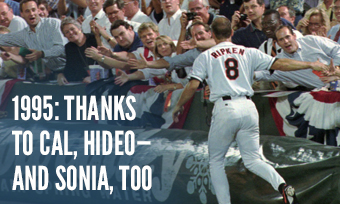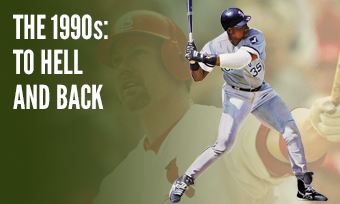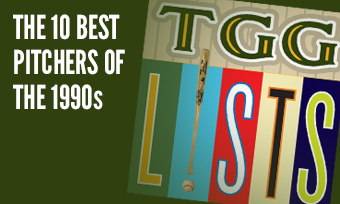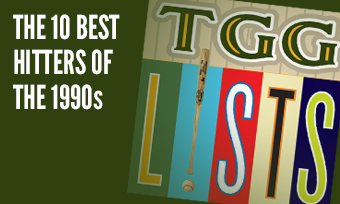The Yearly Reader
Leaders and Honors, 1995
Our list of baseball’s top 10 hitters and pitchers in both the American League and National League for the 1995 baseball season, as well as the awards and honors given to the game’s top achievers of the year.
The National League’s Top 10 Hitters, 1995
Bold type in brick red indicates league leader.
1. Barry Bonds, San Francisco
Key Numbers: 144 games, .294 average, 109 runs, 30 doubles, 7 triples, 33 home runs, 104 RBIs, 120 walks, 22 intentional walks, 31 stolen bases, .431 on-base percentage.
Relatively modest output for Bonds, by his standards—yet he clearly remained head and (almost) shoulders above the rest of the National League.
2. Dante Bichette, Colorado
Key Numbers: .340 average, 102 runs, 197 hits, 38 doubles, 40 home runs, 128 RBIs, 22 walks, 13 stolen bases, .620 slugging percentage.
Bichette became the first of the Coors Field poster boys, putting up mile-high numbers at home for the Rockies while remaining static on the road.
3. Reggie Sanders, Cincinnati
Key Numbers: .306 average, 91 runs, 36 doubles, 6 triples, 28 home runs, 99 RBIs, 36 stolen bases.
Barry Larkin got all the accolades (i.e., the NL MVP) in Cincinnati, but Sanders certainly deserved at least equal billing.
4. Larry Walker, Montreal
Key Numbers: .306 average, 96 runs, 31 doubles, 5 triples, 36 home runs, 101 RBIs, 14 hit-by-pitches, 16 stolen bases.
One of the many ex-Expos deemed too expensive to stay in low-budget Montreal, Walker’s bat and Denver’s mile-high atmosphere became a lethal mix; he became one four Rockies with at least 30 homers, the second such quartet to do so after the 1977 Dodgers.
5. Craig Biggio, Houston
Key Numbers: .302 average, 123 runs, 167 hits, 30 doubles, 22 home runs, 77 RBIs, 80 walks, 22 hit-by-pitches, 33 stolen bases.
Picking up the slack for a cooled down Jeff Bagwell, Biggio twice scored five runs in a game; only two other players did it once in 1995.
6. Barry Larkin, Cincinnati
Key Numbers: .302 average, 123 runs, 167 hits, 30 doubles, 22 home runs, 77 RBIs, 80 walks, 22 hit-by-pitches, 33 stolen bases.
The veteran shortstop was a classic case of winning the MVP for more than just the numbers, as good as they were; his unquestioned leadership and excellent Gold Glove-winning defense were all part of his package.
7. Mark Grace, Chicago
Key Numbers: .326 average, 97 runs, 180 hits, 51 doubles, 16 home runs, 92 RBIs.
The Cubs’ all-time leader in doubles during the modern, post-Cap Anson era set a personal best with 51.
8. Mike Piazza, Los Angeles
Key Numbers: 112 games, .346 average, 82 runs, 32 home runs, 93 RBIs.
Piazza had the inside track to dethrone Tony Gwynn in the NL batting race, but his 10-point lead over the Padres’ star wilted in September. Power-wise, 23 of his 32 homers came on the road.
9. Ron Gant, Cincinnati
Key Numbers: 119 games, .276 average, 79 runs, 29 home runs, 88 RBIs, 74 walks, 23 stolen bases.
Gant had yet another comeback year, thanks to a Reds team willing to pick him up after a broken leg in an ATV accident voided a rich contract with the Braves.
10. Tony Gwynn, San Diego
Key Numbers: .368 average, 82 runs, 197 hits, 33 doubles, 9 home runs, 90 RBIs, 17 stolen bases, 20 grounded into double plays.
After slightly slumping in May and into June, Gwynn picked up the pace, hit his 1994 groove and batted .395 from June 23 on.
The American League’s Top 10 Hitters, 1995
1. Edgar Martinez, Seattle
Key Numbers: 145 games, .356 average, 121 runs, 182 hits, 52 doubles, 29 home runs, 112 RBIs, 116 walks, .479 on-base percentage.
Overcoming injury and a lousy reputation with his glove, a healthy Martinez was given full-time DH duties and saw his numbers explode.
2. Albert Belle, Cleveland
Key Numbers: .317 average, 121 runs, 173 hits, 52 doubles, 50 home runs, 126 RBIs, 24 grounded into double plays, .690 slugging percentage.
If anger was a steroid, then Belle juiced himself with rage as never before or since—except maybe after finding out he lost the AL MVP to Mo Vaughn by a 308-300 vote margin.
3. Frank Thomas, Chicago
Key Numbers: 145 games, .308 average, 102 runs, 27 doubles, 40 home runs, 111 RBIs, 136 walks, 29 intentional walks, 12 sacrifice flies.
Even while handicapped with strike-shortened schedules, Thomas still managed to hit over .300 and collect at least 20 homers, 100 runs, 100 RBIs and 100 walks for the fifth straight year—breaking a mark held by two guys named Lou Gehrig and Ted Williams.
4. Tim Salmon, California
Key Numbers: .330 average, 111 runs, 177 hits, 34 doubles, 34 home runs, 105 RBIs, 91 walks.
Before there was (Mike) Trout, there was Salmon, the favored catch of the day at Anaheim with a swimmingly strong year for the Angels.
5. Mo Vaughn, Boston
Key Numbers: .300 average, 98 runs, 165 hits, 28 doubles, 39 home runs, 126 RBIs, 150 strikeouts, 14 hit-by-pitches, 11 stolen bases.
While other players amassed more stats, nobody meant more to his team than AL MVP Vaughn at Boston.
6. John Valentin, Boston
Key Numbers: .298 average, 108 runs, 37 doubles, 27 home runs, 102 RBIs, 10 hit-by-pitches, 20 stolen bases.
Not to be confused with up-and-coming Milwaukee shortstop Jose Valentin—whose last name was pronounced differently (rhymed with ‘valentine’), this Valentin stole the hearts of Boston fans after a career-year effort.
7. Mark McGwire, Oakland
Key Numbers: 104 games, .274 average, 75 runs, 39 home runs, 90 RBIs, 88 walks, 11 hit-by-pitches.
Though struggling to avoid big-time injury for the third straight season—he missed 244 games since the start of 1993—McGwire was starting to get more notice with a home run rate escalating even beyond that of his early breakout days of the late 1980s.
8. Chuck Knoblauch, Minnesota
Key Numbers: .333 average, 107 runs, 179 hits, 34 doubles, 8 triples, 11 home runs, 63 RBIs, 78 walks, 10 hit-by-pitches, 46 stolen bases.
All but convinced he would be traded at season’s end, Knoblauch certainly put on a good performance to showcase his talents.
9. Rafael Palmeiro, Baltimore
Key Numbers: .310 average, 89 runs, 172 hits, 30 doubles, 39 home runs, 104 RBIs.
Still stung by his claim that Will Clark ‘stole’ his first-base job in Texas, the second-year Oriole began an impressive streak of nine straight seasons with at least 38 home runs.
10. Jay Buhner, Seattle
Key Numbers: .262 average, 86 runs, 23 doubles, 40 home runs, 120 RBIs.
The taut slugger upgraded himself from the 20-homer range to the 40s, where he’d stay through 1997—and Yankees fan Frank Costanza was never more enraged over the trade that made him a Mariner back in 1988.
The National League’s Top 10 Pitchers, 1995
1. Greg Maddux, Atlanta
Key Numbers: 1.63 ERA, 19 wins, 2 losses, .905 win percentage, 28 starts, 10 complete games, 3 shutouts, 209.2 innings, 23 walks, 26 stolen bases allowed.
The incomparable Maddux became the first pitcher to register back-to-back ERAs under 2.00 since Sandy Koufax; among his more notable feats of 1995 was a then-NL record 17 straight wins on the road.
2. Tom Glavine, Atlanta
Key Numbers: 3.08 ERA, 16 wins, 7 losses, .696 win percentage, 29 starts, 198.2 innings, 26 grounded into double plays.
Interestingly, Glavine’s ERA was a run worse at home—where early in the season he constantly heard the wrath of Braves fans angered over his role as union player rep.
3. Pete Schourek, Cincinnati
Key Numbers: 3.22 ERA, 18 wins, 7 losses, .720 win percentage, 29 starts, 190.1 innings, 7 stolen bases allowed, 12 caught stealing/picked off.
To say that the Reds’ Schourek had a career year is putting it lightly; the 18-game winner won no more than eight in any of his 10 other major league seasons.
4. Ismael Valdes, Los Angeles
Key Numbers: 3.05 ERA, 13 wins, 11 losses, 1 save, 33 appearances, 27 starts, 197.2 innings.
While teammate Hideo Nomo was grabbing all the attention in Dodgerland and beyond, it was Valdes—another first-full year import, from Mexico—who arguably had a more efficient year.
5. Joey Hamilton, San Diego
Key Numbers: 3.08 ERA, 6 wins, 9 losses, 30 starts, 204.1 innings, 11 hit-by-pitches, 22 grounded into double plays.
Fifty-eight NL pitchers had more wins than the luckless Hamilton, but only four had better qualifying ERAs.
6. Todd Worrell, Los Angeles
Key Numbers: 2.02 ERA, 4 wins, 1 loss, 32 saves, 4 blown saves, 59 appearances, 62.1 innings, 10 stolen bases allowed.
It took a few years, but Worrell finally regained the toughness that made him one of the premier closers back in the late 1980s with St. Louis.
7. Ramon Martinez, Los Angeles
Key Numbers: 3.66 ERA, 17 wins, 7 losses, .708 win percentage, 30 starts, 206.1 innings, 81 walks, 19 grounded into double plays.
Like emerging star brother Pedro—who threw nine perfect innings before conceding a hit in the 10th during a June start—Martinez missed his shot at perfection with a two-out, eighth-inning walk to the Marlins on July 14, but still got the no-hitter.
8. Hideo Nomo, Los Angeles
Key Numbers: 2.54 ERA, 13 wins, 6 losses, .684 win percentage, 28 starts, 3 shutouts, 191.1 innings, 78 walks, 236 strikeouts, 19 wild pitches, 5 balks, 30 stolen bases allowed.
Despite his wildness and ignorance of baserunners, baseball’s sensation of the year was valid for his home ERA (1.73) and an overall opposing batting average of .182—the lowest by an NL pitcher in 10 years.
9. Mark Wohlers, Atlanta
Key Numbers: 2.09 ERA, 7 wins, 3 losses, 25 saves, 4 blown saves, 65 appearances, 64.2 innings.
The 100-MPH closer realized everything he was taught about pitching from Tom Seaver just wasn’t good enough—and found his own path toward ninth-inning success in Atlanta.
10. John Smiley, Cincinnati
Key Numbers: 3.46 ERA, 12 wins, 5 losses, .706 win percentage, 27 starts, 176.2 innings, 39 walks, 21 grounded into double plays.
After a few rocky years, the one-time 20-game winner for the Pirates found brief redemption on another playoff-bound side in the Reds.
The American League’s Top 10 Pitchers, 1995
1. Randy Johnson, Seattle
Key Numbers: 2.48 ERA, 18 wins, 2 losses, .900 win percentage, 30 starts, 214.1 innings, 294 strikeouts, 19 stolen bases allowed.
How automatic was Johnson? The Mariners were 27-3 when he started. It was the first of five Cy Young Awards for the Big Unit.
2. Mike Mussina, Baltimore
Key Numbers: 3.29 ERA, 19 wins, 9 losses, 7 complete games, 4 shutouts, .679 win percentage, 32 starts, 221.2 innings, 50 walks.
Once again, the work stoppage jobbed Mussina out of another opportunity to win 20 games.
3. Jose Mesa, Cleveland
Key Numbers: 1.13 ERA, 3 wins, 0 losses, 46 saves, 2 blown saves, 62 appearances, 64 innings.
An undistinguished starter two years earlier, Mesa took on the closer role and had the year of his life; in one stretch, he saved 38 straight opportunities without blowing one, at the time a record.
4. Tim Wakefield, Boston
Key Numbers: 2.95 ERA, 16 wins, 8 losses, 27 starts, 195.1 innings, 11 wild pitches, 9 hit-by-pitches.
1992 Sporting News Rookie of the Year and 1994 minor league dud, Wakefield rebounded to prominence with his knuckler in Boston.
5. Kenny Rogers, Texas
Key Numbers: 3.38 ERA, 17 wins, 7 losses, .708 win percentage, 31 starts, 208 innings.
A year after throwing the first perfect game in Rangers franchise history, Rogers entered the team record book anew with a consecutive scoreless inning streak of 40.1—longest in Rangers annals.
6. Kevin Brown, Baltimore
Key Numbers: 3.60 ERA, 10 wins, 9 losses, 26 starts, 172.1 innings, 22 grounded into double plays.
In the midst of a transitory period in which he’d play for five teams over a six-year period, Brown rebounded from a subpar 4.82 ERA for the 1994 Rangers—though it took a strong finish (5-1, 2.11 ERA over his last eight starts) to make it his lone year at Baltimore respectable.
7. Dennis Martinez, Cleveland
Key Numbers: 3.08 ERA, 12 wins, 5 losses, .706 win percentage, 28 starts, 187 innings, 12 hit-by-pitches.
Showing how to do it right at age 40, Martinez shined on a Cleveland rotation that otherwise posted a 4.52 ERA.
8. Kevin Appier, Kansas City
Key Numbers: 3.89 ERA, 15 wins, 10 losses, 31 starts, 201.1 innings, 20 grounded into double plays.
The reliable Royals right-hander started the year at 11-2 with a 2.04 ERA, and threw a pair of perfect innings at the All-Star Game, before a late-season slide.
9. David Cone, Toronto-New York
Key Numbers: 3.82 ERA, 18 wins, 8 losses, .692 win percentage, 30 starts, 229.1 innings, 88 walks, 11 wild pitches, 28 stolen bases allowed.
The reigning AL Cy Young winner split his 18 wins evenly between the Blue Jays and Yankees, then added another in New York’s spirited but ultimately unsuccessful ALDS against Seattle.
10. Jim Abbott, Chicago-California
Key Numbers: 3.70 ERA, 11 wins, 8 losses, 30 starts, 197 innings, 25 grounded into double plays.
Abbott’s tenure with the White Sox was over barely after it had begun, traded back to where it all started for him in Anaheim with the contending Angels; he’d return to Chicago in 1998 for another brief yet successful (5-0) spell.









